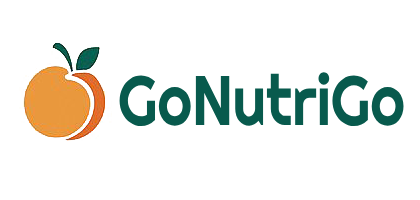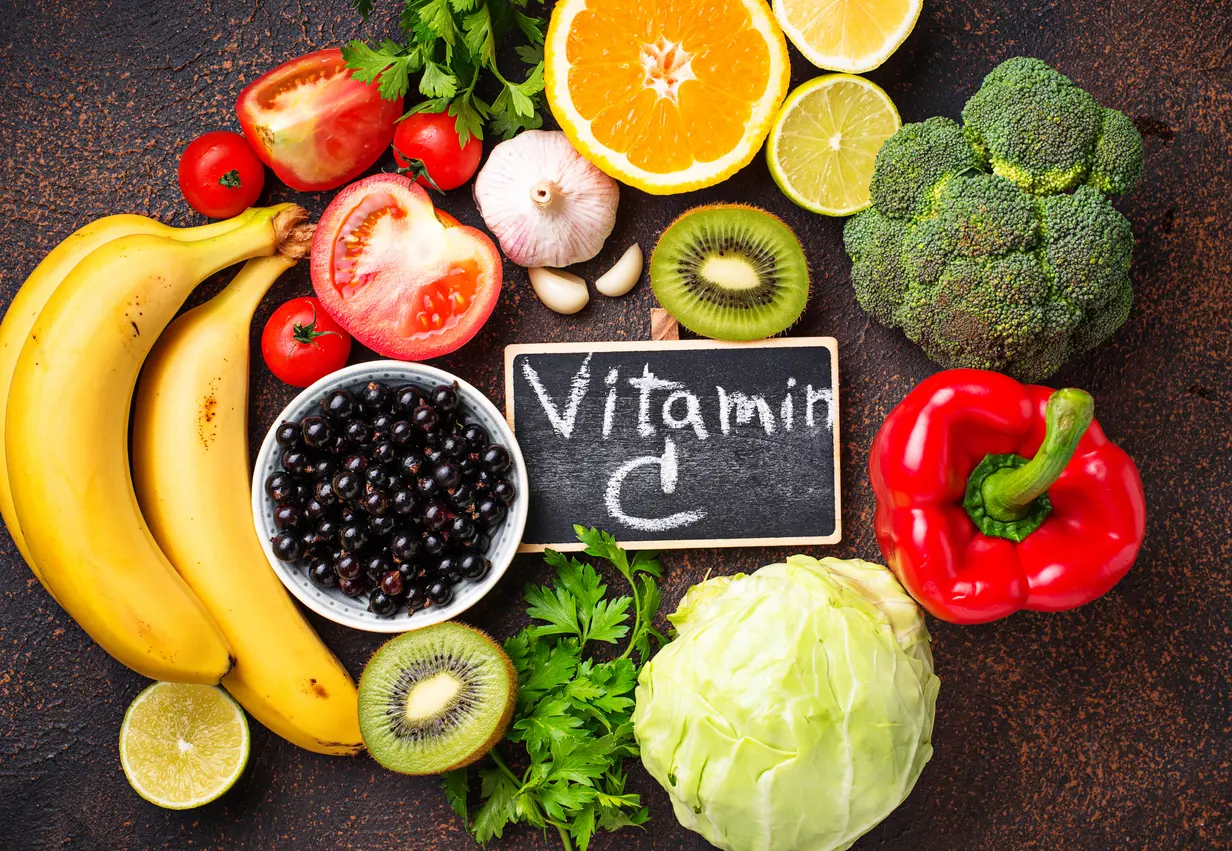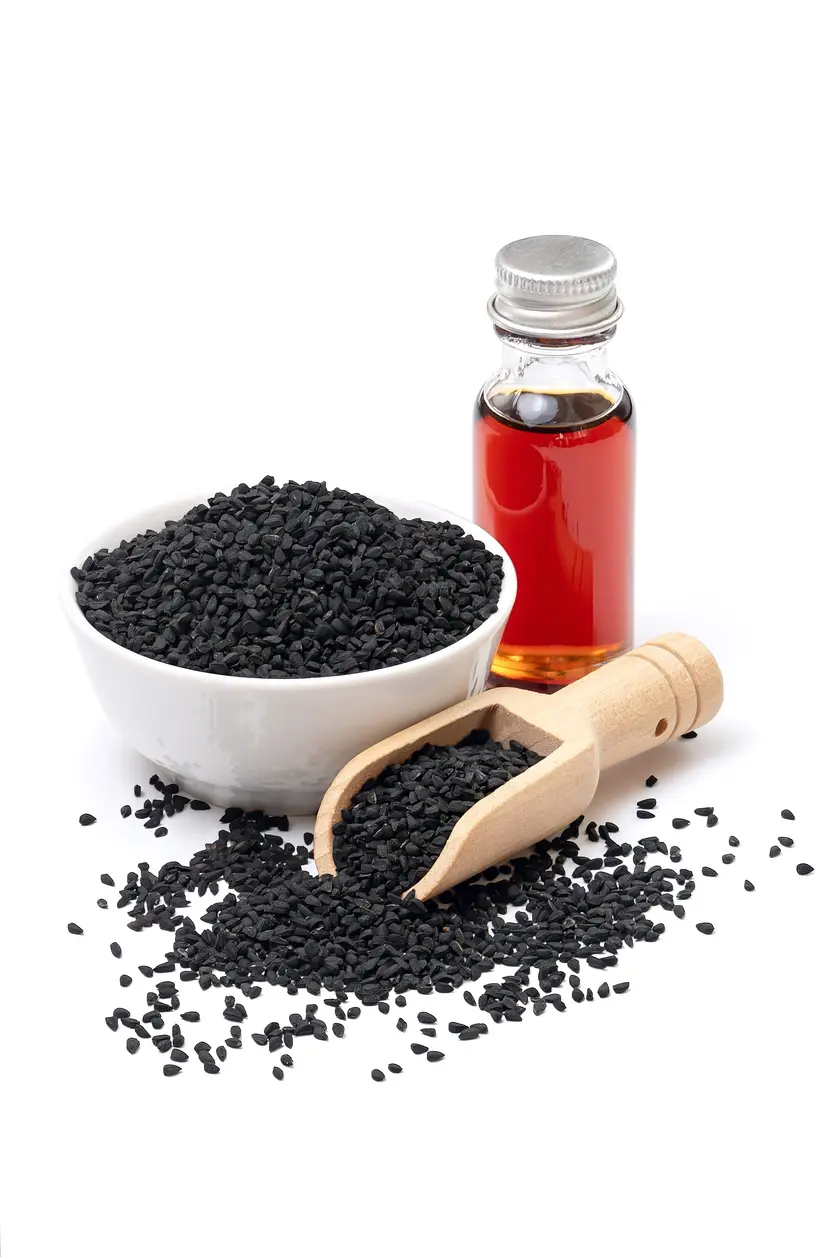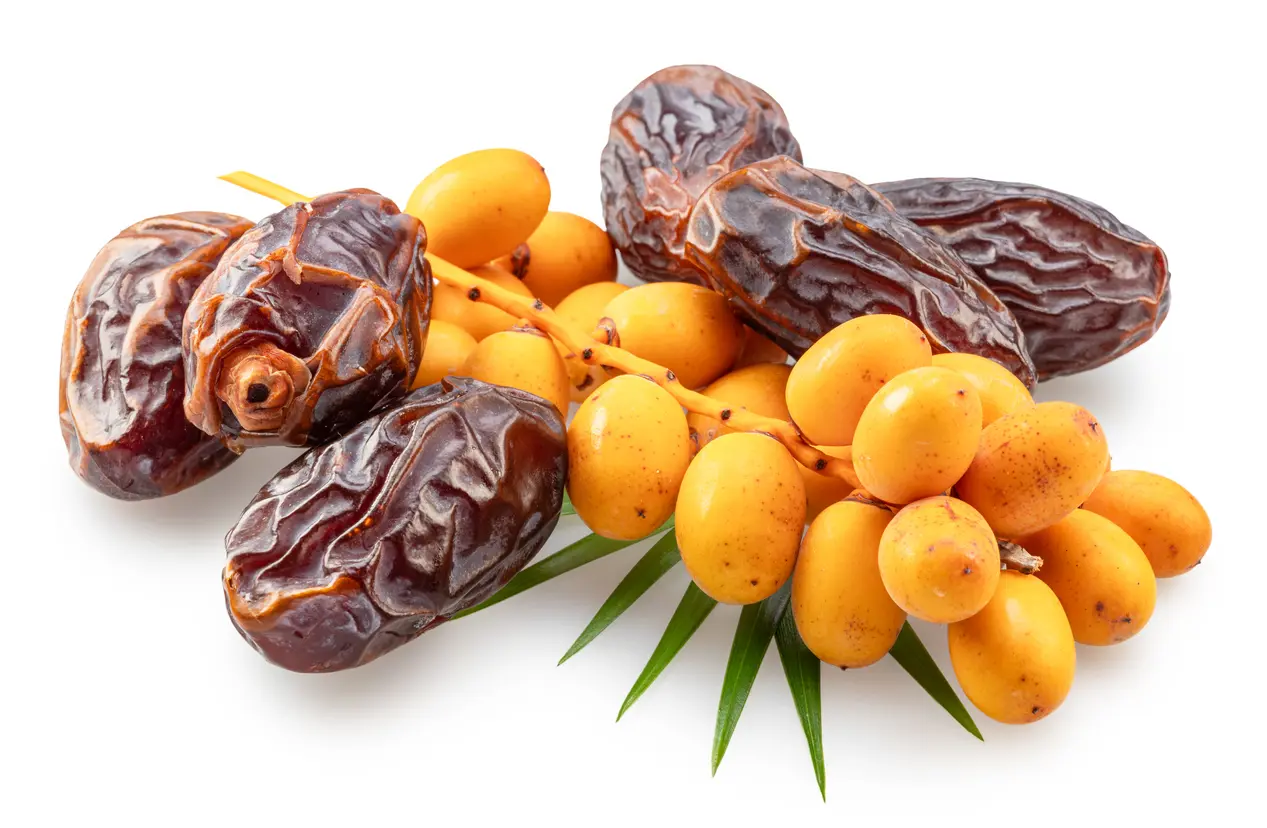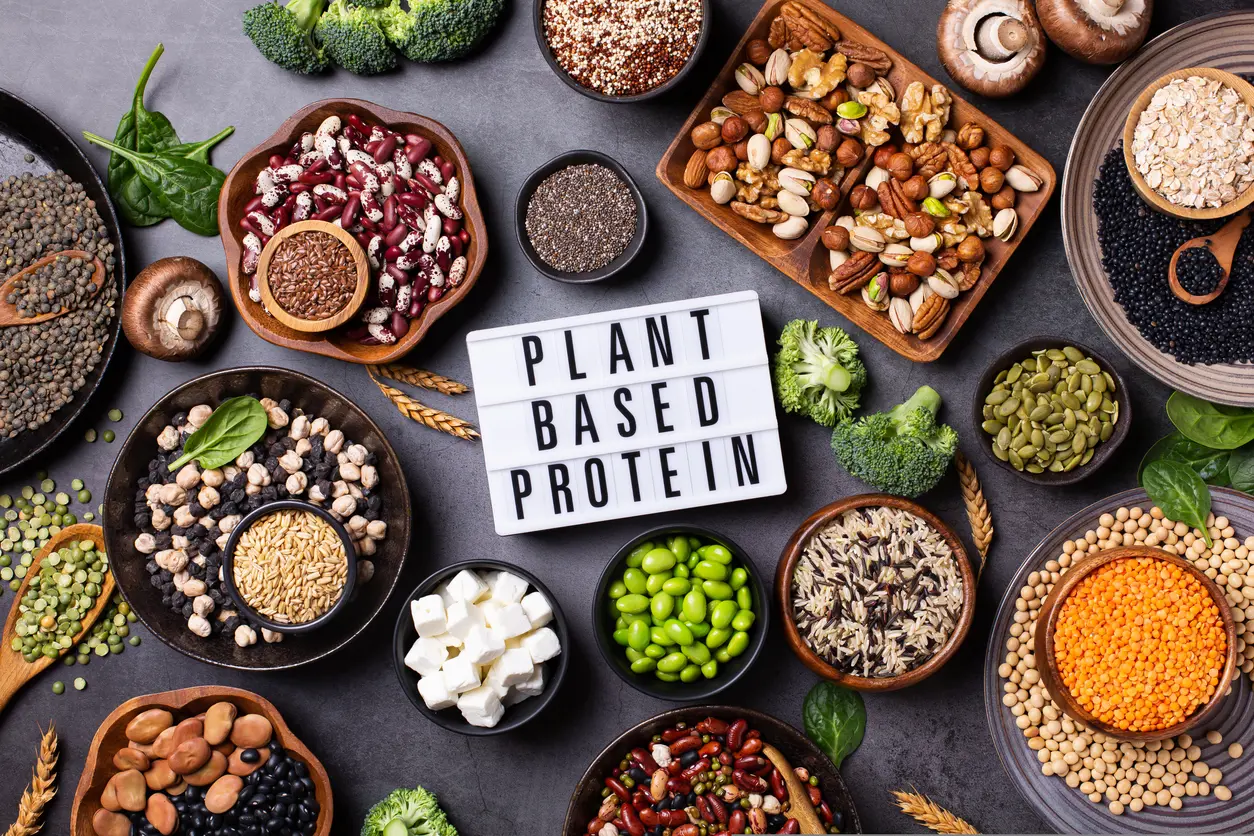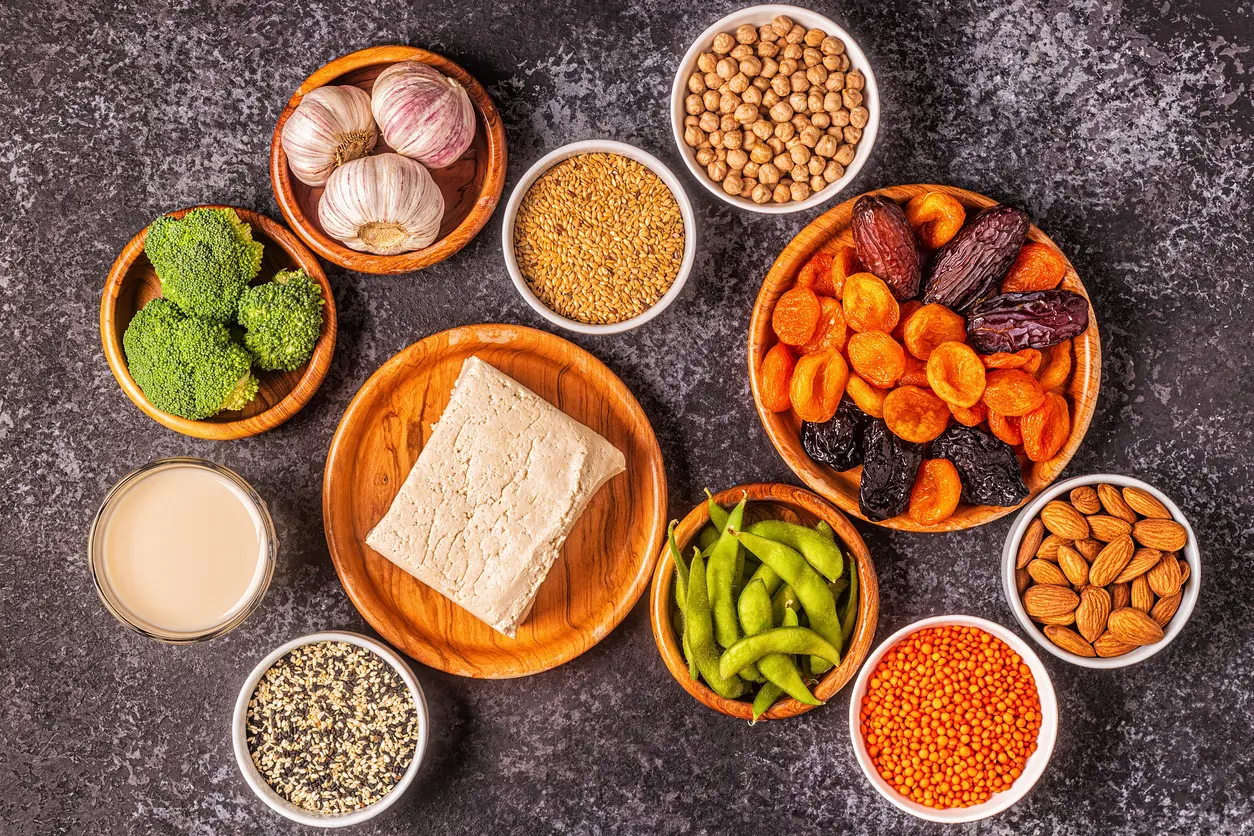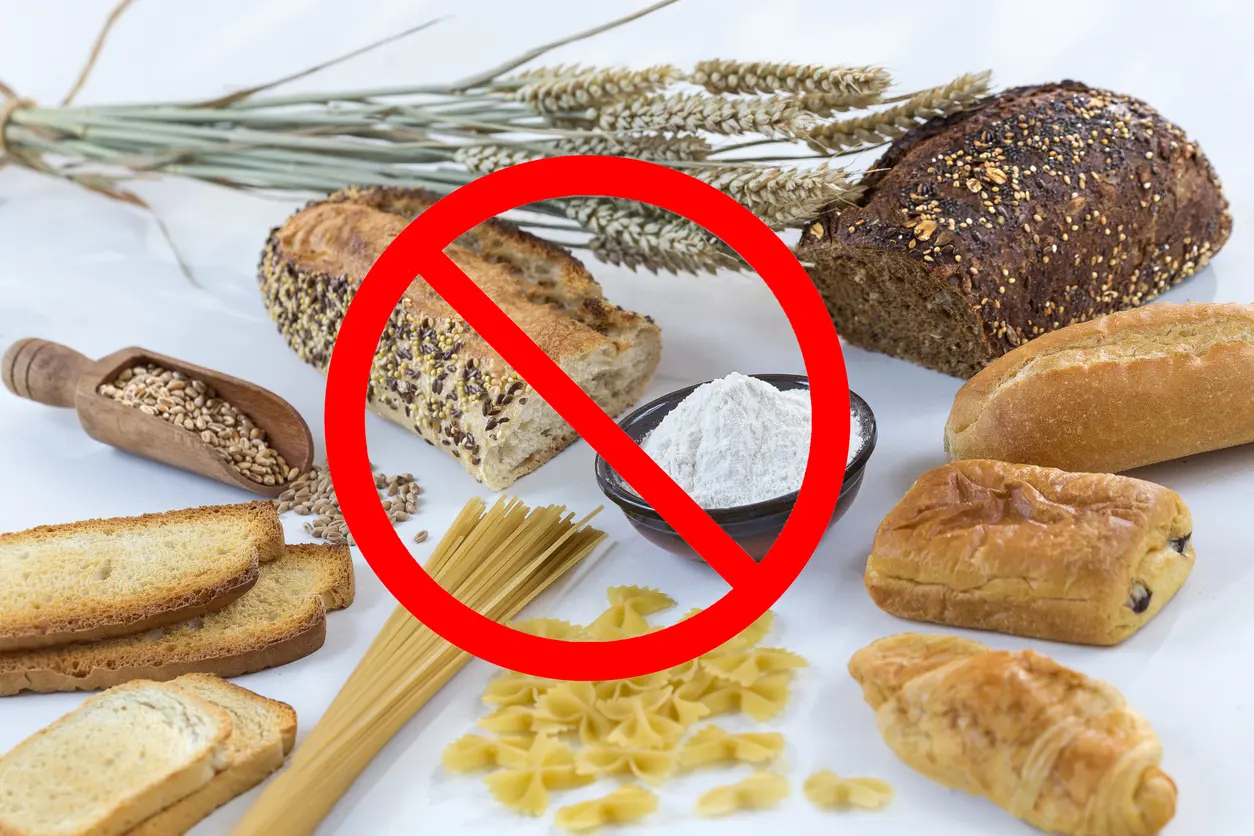20 Vitamins B12 Rich Foods And Health Benefits
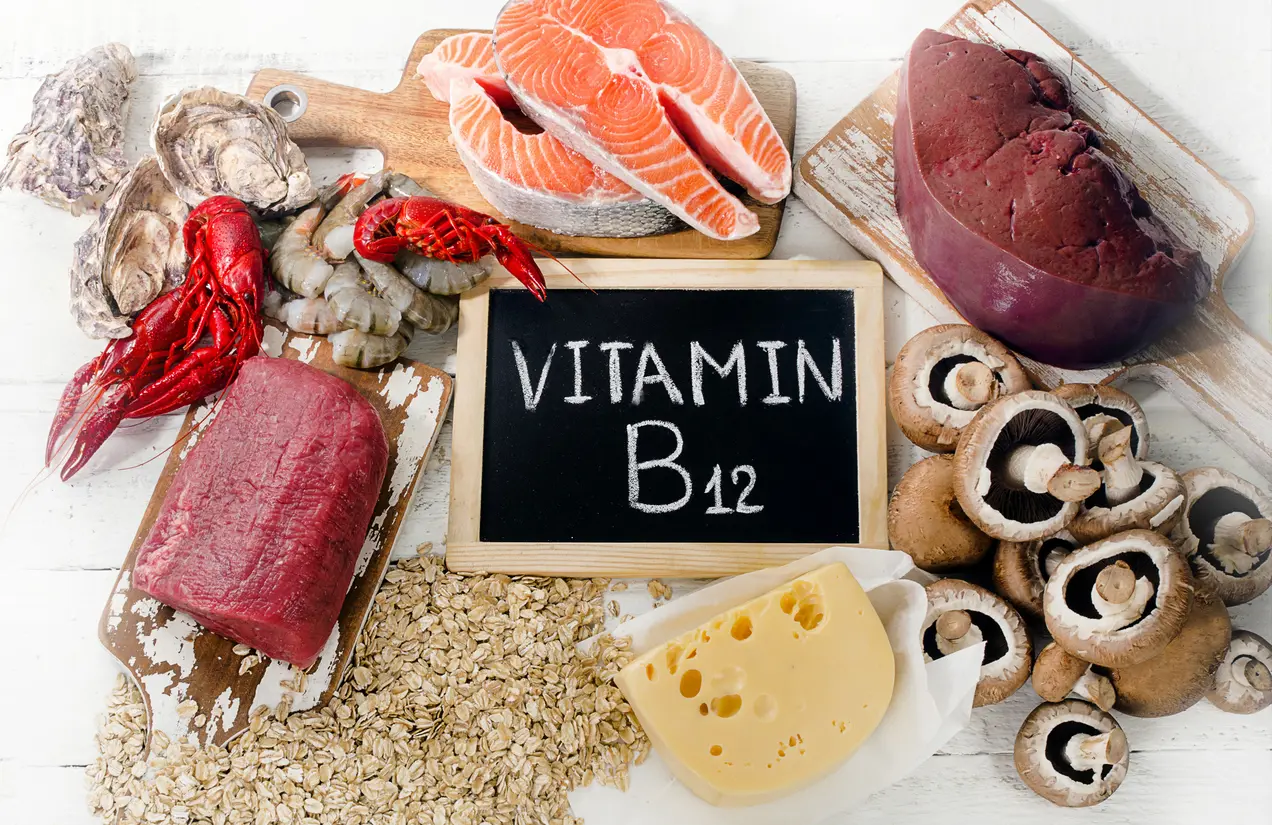
Are you feeling tired all the time? Struggling with brain fog or tingling hands and feet? These symptoms may indicate a vitamin B12 deficiency, a common yet often overlooked issue, particularly in older adults and individuals following a plant-based diet.
Vitamin B12 is essential for energy production, red blood cell formation, and keeping your brain and nervous system functioning correctly. Unlike many other nutrients, your body can’t make B12 on its own. Instead, it must come from food or supplements. The catch? Most natural sources of B12 are animal-based, putting vegetarians, vegans, and even some omnivores at risk of falling short.
In this guide, we’ll walk through 20 of the best food sources of vitamin B12, including seafood, meats, dairy, and fortified plant-based options. Whether you're looking to boost energy or support long-term health, these foods can help you meet your B12 needs naturally through whole foods.
20 Vitamin B12 Rich Foods
Whether you eat animal products or stick to a plant-based lifestyle, getting enough vitamin B12 is essential for maintaining your energy levels, supporting red blood cell production, and protecting your nervous system. B12 is found naturally in animal-based foods and in certain fortified plant products, making it accessible to most people with thoughtful choices.
Below you’ll find 20 foods that are especially rich in vitamin B12, with tips on how much they contain, who they’re suitable for, and how to include them in your meals. From shellfish and dairy to cereals and nutritional yeast, this list covers both traditional and vegan-friendly options to help you stay energized and nourished.
1. Clams
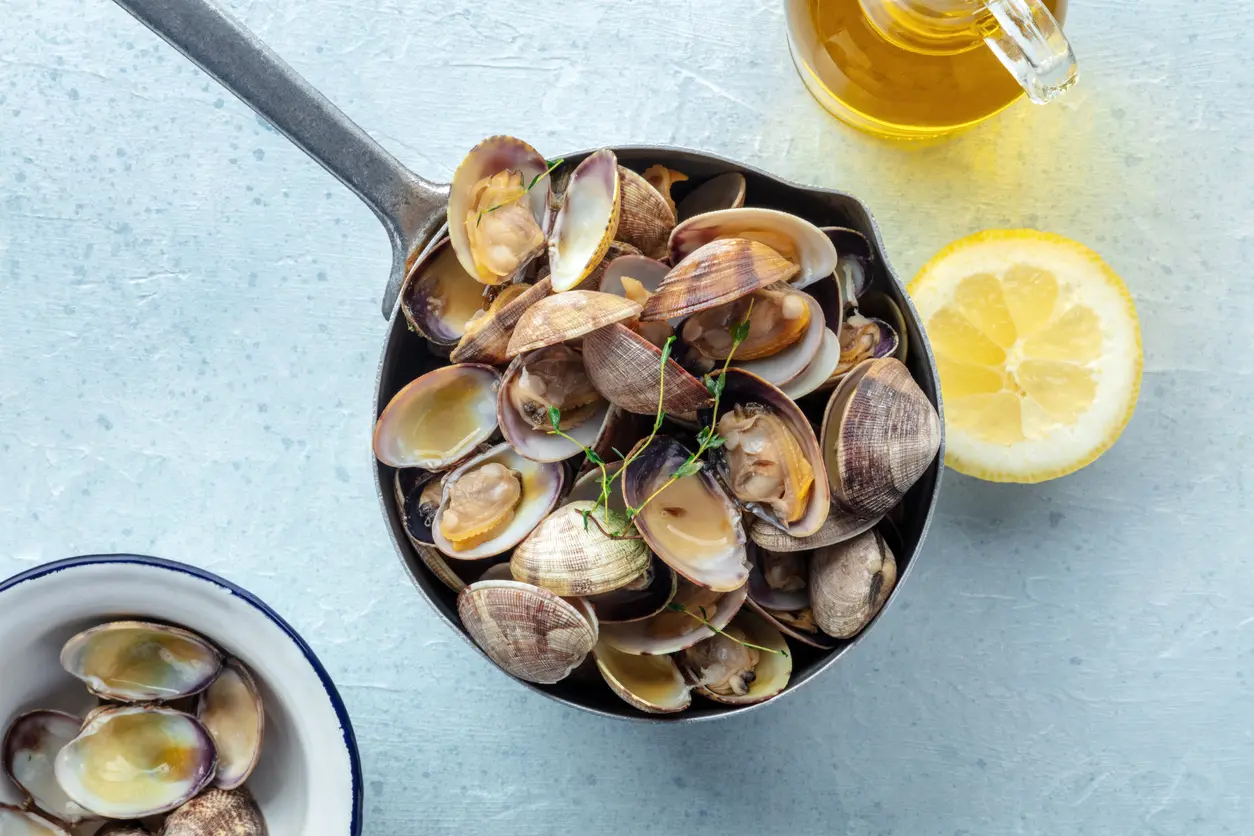
Clams are one of the most concentrated sources of vitamin B12 available. Just 3 ounces of cooked clams can provide over 1,400% of the Daily Value (DV) for vitamin B12, making them an excellent choice for quickly boosting your levels. In addition to B12, clams offer iron, selenium, and lean protein. [1] Solimabi Wahidullah, Prabha Devi, Lisette D’Souza Chemical composition, nutritive value and health benefits of edible clam Meretrix casta (Chemnitz) from West Coast of India, 2020. doi: 10.1007/s13197-020-04630-z
- Why it’s beneficial: Clams are great for individuals with anemia, low energy, or nutrient deficiencies. They’re also a heart-healthy source of omega-3s and iron.
- Who it’s good for: Pescatarians, people with iron-deficiency anemia, and anyone looking for a seafood-based B12 powerhouse.
- How to eat it: Steam fresh clams with garlic and herbs, add them to seafood pasta, or use canned clams in chowder or dips.
2. Liver (Beef or Chicken)
Organ meats, especially liver, are among the richest natural sources of vitamin B12. Just 3 ounces of cooked beef liver contains over 3,000% of the Daily Value (DV). It’s also high in vitamin A, iron, folate, and copper, making it one of the most nutrient-dense foods available. [2] Sung-Won Kang, Hye-Min Kim, M Shafiur Rahman, Ah-Na Kim, Han-Sul Yang, Sung-Gil Choi Nutritional Quality and Physicochemical Characteristics of Defatted Bovine Liver Treated by Supercritical Carbon Dioxide and Organic Solvent, 2017, doi: 10.5851/kosfa.2017.37.1.29
- Why it’s beneficial: Excellent for correcting B12 deficiency quickly, also supports immune function, red blood cell production, and cognitive health.
- Who it’s good for: People with diagnosed B12 deficiency, fatigue, or iron deficiency. Less ideal for pregnant individuals due to high vitamin A content.
- How to eat it: Pan-fry with onions, blend into pâté, or chop into sauces or meatballs to reduce the strong flavor.
3. Sardines
Sardines are a small but mighty seafood option when it comes to B12. Just one 3.75-ounce can of sardines in oil contains about 350% of the DV. They’re also rich in omega-3 fatty acids, vitamin D, calcium, and protein. [3] Heitor O Santos, Theresa L May, Allain A Bueno Eating more sardines instead of fish oil supplementation: Beyond omega-3 polyunsaturated fatty acids, a matrix of nutrients with cardiovascular benefits, 2023, doi: 10.3389/fnut.2023.1107475
- Why it’s beneficial: Sardines support brain health, bone strength, and inflammation control. They’re also a sustainable fish option.
- Who it’s good for: Pescatarians, people seeking heart and brain health benefits, and those who need easy, affordable B12 sources.
- How to eat it: Enjoy on whole-grain crackers, toss into pasta, or mix with lemon and olive oil for a quick salad.
4. Salmon
Salmon is a well-rounded source of vitamin B12, with around 200% of the DV per 6-ounce cooked fillet. It’s also packed with high-quality protein, anti-inflammatory omega-3 fats, and vitamin D. [4] Kristin S Hustad, Inger Ottestad, Thomas Olsen, Thomas Sæther, Stine M Ulven, Kirsten B Holven Salmon fish protein supplement increases serum vitamin B12 and selenium concentrations: secondary analysis of a randomised controlled trial, 2022, doi: 10.1007/s00394-022-02857-4
- Why it’s beneficial: Supports heart health, mood, cognition, and hormonal balance. Also provides long-lasting energy and satiety.
- Who it’s good for: Athletes, people managing inflammation, and anyone aiming to support cardiovascular or cognitive function.
- How to eat it: Bake, grill, or pan-sear with herbs, or add to grain bowls and salads.
5. Tuna
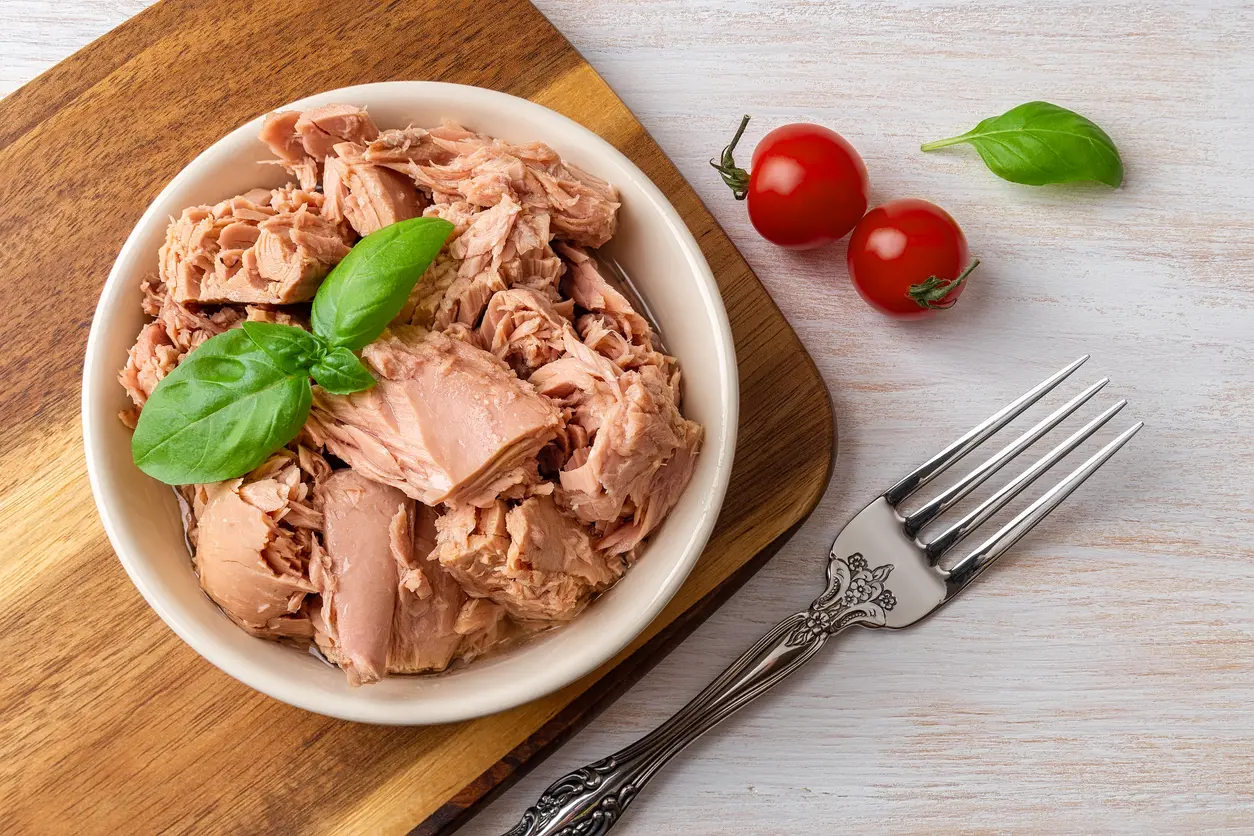
Tuna, especially the light canned variety, is another excellent source of B12. A 3-ounce serving of canned tuna contains about 150% of the DV, making it a convenient option for meals or snacks. [5] F Chamorro, L Cassani, P Garcia-Oliveira et. al Health benefits of bluefin tuna consumption: (Thunnus thynnus) as a case study, 2024, doi: 10.3389/fnut.2024.1340121
- Why it’s beneficial: Tuna provides lean protein and selenium along with B12. It’s low in fat and easy to store, making it ideal for meal prep or pantry meals.
- Who it’s good for: Busy individuals, athletes, and those looking for low-fat, high-protein B12 sources.
- How to eat it: Mix with Greek yogurt or avocado for a tuna salad, layer it into wraps, or toss it into pasta dishes.
6. Beef (Lean Cuts)
Lean cuts of beef, such as sirloin or tenderloin, are excellent sources of B12. A 3-ounce serving typically provides about 100–150% of the DV. Beef also contains iron, zinc, and high-quality protein, all of which are important for maintaining muscle and immune health. [6] Rima Obeid, Sandra G Heil, Maxime M A Verhoeven et. al Vitamin B12 Intake From Animal Foods, Biomarkers, and Health Aspects, 2019, doi: 10.3389/fnut.2019.00093
- Why it’s beneficial: Helps support muscle repair, red blood cell production, and cognitive health, which is a good option for those who don’t eat fish or organ meats.
- Who it’s good for: Omnivores, athletes, and people with higher protein and iron needs.
- How to eat it: Grill or broil lean steaks, add to stir-fries, or include in tacos or burrito bowls.
7. Fortified Cereals
Fortified breakfast cereals are one of the most reliable plant-based sources of vitamin B12. Depending on the brand, a 1-cup serving can provide 25% to 100% or more of the Daily Value (DV). Always check the label for the exact amount. [7] Vitamin B12, NIH
- Why it’s beneficial: Fortified cereals offer a consistent, shelf-stable way to get B12, especially important for vegans and vegetarians. Many are also enriched with iron, folate, and B vitamins.
- Who it’s good for: Vegans, vegetarians, kids, and older adults with lower absorption rates.
- How to eat it: Pair with fortified plant-based milk, sprinkle over yogurt, or use as a base for homemade trail mix.
8. Fortified Plant-Based Milk
Many brands of non-dairy milk, especially soy, almond, and oat, are fortified with vitamin B12, usually supplying up to 50% of the DV per 1-cup serving. Fortified plant milks are essential for people who avoid dairy. [8] Rebecca Ramsing, Raychel Santo, Brent F Kim et. al Dairy and Plant-Based Milks: Implications for Nutrition and Planetary Health, 2023, doi: 10.1007/s40572-023-00400-z
- Why it’s beneficial: Offers a vegan-friendly, easily absorbed source of B12. Also provides calcium, vitamin D, and sometimes added protein, depending on the brand.
- Who it’s good for: Vegans, individuals with lactose intolerance, and those who prefer plant-based eating.
- How to eat it: Pour over cereal, blend into smoothies, or use in coffee and cooking.
9. Eggs
Eggs, especially the yolks, contain small but meaningful amounts of vitamin B12. A large egg provides about 6% of the DV, so while not a standalone solution, they can be part of a B12-supportive diet. [6] Rima Obeid, Sandra G Heil, Maxime M A Verhoeven et. al Vitamin B12 Intake From Animal Foods, Biomarkers, and Health Aspects, 2019, doi: 10.3389/fnut.2019.00093
- Why it’s beneficial: In addition to B12, eggs are rich in choline, selenium, and high-quality protein. They support brain development and muscle repair.
- Who it’s good for: Vegetarians, athletes, and individuals looking to support energy and nutrient intake.
- How to eat it: Boil for snacks, scramble with veggies, or bake into breakfast muffins.
10. Milk and Dairy Products
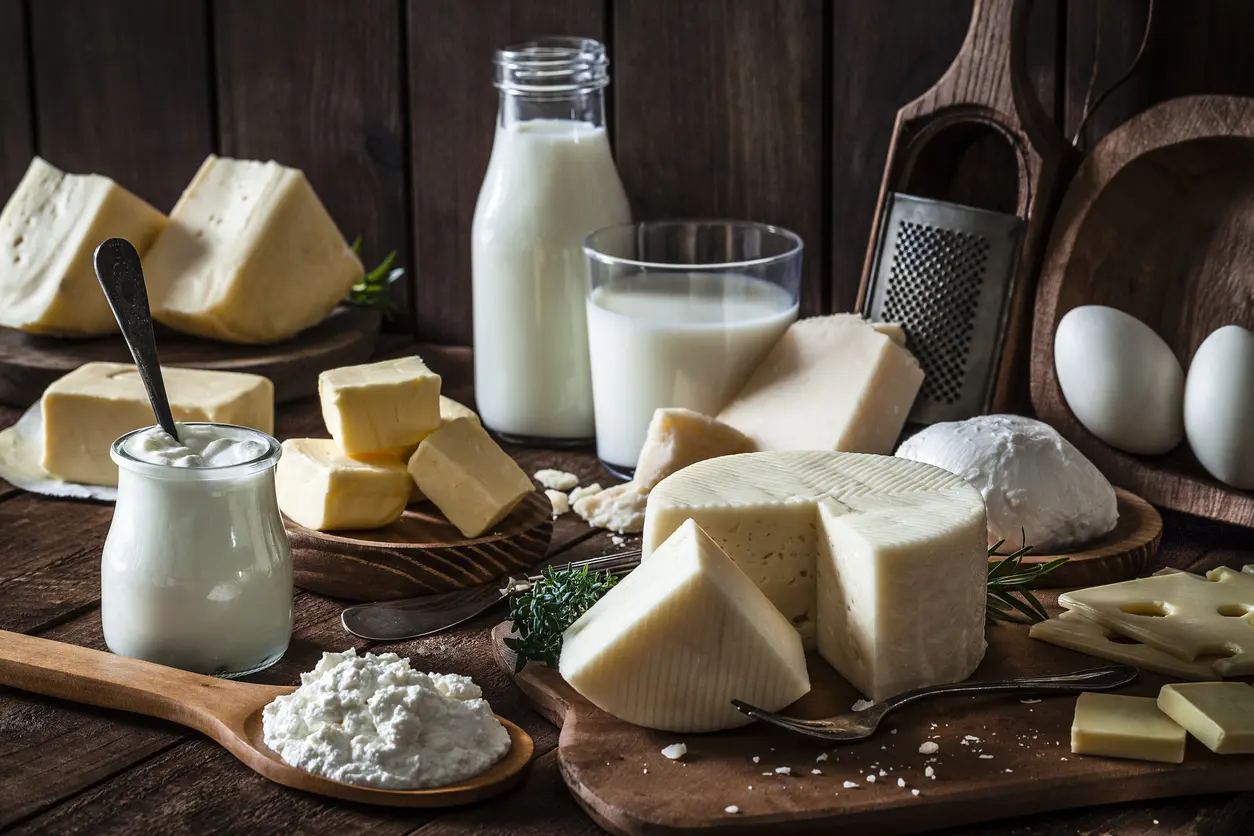
Dairy foods like milk, cheese, and yogurt provide moderate amounts of vitamin B12. One cup of milk contains about 46% of the DV, while yogurt and hard cheeses like Swiss or cheddar offer 15–25% per serving. [7] Vitamin B12, NIH
- Why it’s beneficial: Dairy is a natural, absorbable source of B12 and also offers calcium, protein, and probiotics (in yogurt).
- Who it’s good for: Vegetarians, children, and individuals not consuming meat or seafood.
- How to eat it: Drink milk with meals, use cheese in sandwiches, or enjoy yogurt with fruit and flaxseeds.
11. Trout
Trout is an excellent source of vitamin B12, with a 3-ounce fillet providing about 125% of the DV. It also offers omega-3 fatty acids, potassium, and selenium, all important nutrients for heart and brain health. [7] Vitamin B12, NIH
- Why it’s beneficial: Supports energy, nerve function, and anti-inflammatory processes in the body. It’s also low in mercury compared to other fish.
- Who it’s good for: Pescatarians, people with inflammatory conditions, and those seeking clean, lean protein sources.
- How to eat it: Grill with lemon and herbs, roast with vegetables, or flake into salads or grain bowls.
12. Mackerel
Mackerel is a fatty fish that delivers a potent dose of vitamin B12. A 3.5-ounce (100-gram) serving provides more than 500% of the Daily Value (DV). It is also an excellent source of omega-3 fatty acids and vitamin D. [7] Vitamin B12, NIH
- Why it’s beneficial: Mackerel supports cardiovascular health, brain function, and energy metabolism. It’s nutrient-dense and often lower in mercury than larger fish.
- Who it’s good for: Pescatarians, people with high triglycerides, or those needing an omega-3 and B12 boost.
- How to eat it: Grill or broil fresh mackerel, or use canned mackerel in salads, spreads, or sandwiches.
13. Crab
Crab is another seafood source rich in vitamin B12, with a 3-ounce serving delivering about 200% of the DV. It is also high in zinc, selenium, and lean protein, all of which support immune and metabolic function. [7] Vitamin B12, NIH
- Why it’s beneficial: Supports energy, immune health, and tissue repair. Its low fat content makes it a good option for lean eating.
- Who it’s good for: People looking for a low-fat B12 source and those who enjoy shellfish without the richness of other organ meats.
- How to eat it: Use fresh crab in salads, tacos, or crab cakes, or opt for canned lump crab for quick meals.
14. Oysters
Oysters are one of the most nutrient-dense shellfish options, with a 3-ounce serving containing over 500% of the DV for vitamin B12. They also provide significant amounts of zinc, copper, and iron. [6] Rima Obeid, Sandra G Heil, Maxime M A Verhoeven et. al Vitamin B12 Intake From Animal Foods, Biomarkers, and Health Aspects, 2019, doi: 10.3389/fnut.2019.00093
- Why it’s beneficial: Oysters support immune health, collagen production, and red blood cell formation. They are a powerhouse for trace minerals and B12.
- Who it’s good for: People with anemia, low immunity, or those seeking a seafood-rich diet for optimal nutrient intake.
- How to eat it: Enjoy raw on the half shell, bake with lemon and herbs, or add to seafood stews.
15. Turkey
Turkey, particularly the dark meat, offers a moderate source of vitamin B12. A 3-ounce serving of cooked turkey delivers about 20–25% of the DV. It’s also high in protein, selenium, and niacin, supporting overall metabolic health. [6] Rima Obeid, Sandra G Heil, Maxime M A Verhoeven et. al Vitamin B12 Intake From Animal Foods, Biomarkers, and Health Aspects, 2019, doi: 10.3389/fnut.2019.00093
- Why it’s beneficial: Helps maintain lean muscle mass, supports immunity, and provides steady energy through protein and B vitamins.
- Who it’s good for: Individuals focused on weight management, athletes, and people who prefer lean poultry over red meat.
- How to eat it: Use sliced turkey in sandwiches, roast whole for dinners, or mix ground turkey into sauces or chili.
16. Chicken Breast
Chicken breast contains smaller amounts of vitamin B12, but it's still a valuable source in a balanced diet. A 3-ounce cooked serving provides about 5–10% of the DV. Combined with its protein content and low fat, it contributes to overall nutrient intake. [6] Rima Obeid, Sandra G Heil, Maxime M A Verhoeven et. al Vitamin B12 Intake From Animal Foods, Biomarkers, and Health Aspects, 2019, doi: 10.3389/fnut.2019.00093
- Why it’s beneficial: Supports muscle repair, satiety, and provides a lower-fat option for people limiting red meat.
- Who it’s good for: Omnivores seeking lean protein, athletes, or individuals with lower calorie needs.
- How to eat it: Grill, roast, or stir-fry with vegetables; slice into salads or grain bowls for meal prep.
17. Nutritional Yeast
Fortified nutritional yeast is a popular plant-based source of vitamin B12. Just two tablespoons can provide 100–250% of the Daily Value (DV), depending on the brand. It’s known for its cheesy, savory flavor and is widely used in vegan cooking. [9] Nicole D White Vitamin B12 and Plant-Predominant Diets, 2022, doi: 10.1177/15598276221076102
- Why it’s beneficial: Offers a reliable, shelf-stable B12 source for vegans and vegetarians. It also contains protein, fiber, and B-complex vitamins.
- Who it’s good for: Vegans, vegetarians, and anyone looking for a versatile, dairy-free B12 boost.
- How to eat it: Sprinkle over popcorn, mix into pasta sauces, or blend into soups and dips for a cheesy flavor.
18. Tofu or Tempeh
Some brands of tofu and tempeh are fortified with vitamin B12, providing 20–50% of the DV per serving. This makes them especially important in plant-based diets, as soy-based products are already a valuable source of protein and minerals. [10] Ali Niklewicz, A David Smith, Alison Smith, Andre Holzer et. al The importance of vitamin B12 for individuals choosing plant-based diets, 2022, doi: 10.1007/s00394-022-03025-4
- Why it’s beneficial: Supports energy, muscle maintenance, and hormone balance, especially when fortified with B12 and calcium.
- Who it’s good for: Vegetarians, vegans, and people looking to reduce animal product intake.
- How to eat it: Stir-fry with vegetables, bake with marinades, or crumble into salads and bowls.
19. Fortified Energy Bars or Shakes
Many nutrition bars and protein shakes are fortified with vitamin B12, providing anywhere from 25% to 100% of the DV per serving. These products are ideal for individuals on the go or those seeking an extra nutritional boost. [11] Chittaranjan Yajnik, Sonal Kasture, Vaishali Kantikar et. al Efficacy of B12 Fortified Nutrient Bar and Yogurt in Improving Plasma B12 Concentrations-Results From 2 Double-Blind Randomized Placebo Controlled Trials, 2021, doi: 10.1177/03795721211025448.
- Why it’s beneficial: Provides portable, quick nutrition—often paired with protein, fiber, and other key vitamins.
- Who it’s good for: Busy professionals, athletes, travelers, and individuals struggling to meet daily B12 needs.
- How to eat it: Use as a snack or meal replacement; look for brands that specifically list B12 on the label.
20. B12 Supplements
While not a food, vitamin B12 supplements are an essential tool for individuals who have trouble absorbing B12 or do not consume enough from the diet alone. Options include tablets, sublingual lozenges, sprays, and B12 injections under medical supervision. [7] Vitamin B12, NIH
- Why it’s beneficial: Supplements provide a direct and effective way to meet B12 needs, especially in deficiency or for those with absorption issues.
- Who it’s good for: Vegans, older adults, people with digestive disorders, or anyone on long-term acid-reducing medications.
- How to include it: Take as recommended by your healthcare provider. B12 is water-soluble, so excess is typically excreted in urine.
Who Is at Risk of Vitamin B12 Deficiency?
Vitamin B12 deficiency is more common than many people realize. Because the body stores B12 for several years, symptoms can develop slowly and go unnoticed until levels are very low. The following groups are at the highest risk and should be especially mindful of their B12 intake:
1. Vegans and Vegetarians
Vitamin B12 is naturally found only in animal-derived foods. Without careful planning or fortified foods, plant-based eaters are at high risk of deficiency. [12] Sávio Fernandes, Leandro Oliveira, Alda Pereira, Maria do Céu Costa et. al Exploring Vitamin B12 Supplementation in the Vegan Population: A Scoping Review of the Evidence, 2024, doi: 10.3390/nu16101442
2. Adults Over Age 60
As we age, stomach acid levels tend to decline, making it harder to absorb B12 from food. Low intrinsic factor (a protein needed for absorption) is also more common in older adults. [13] Giacomo Marchi, Fabiana Busti, Acaynne Lira Zidanes, Alice Vianello, Domenico Girelli Cobalamin Deficiency in the Elderly, 2020, doi: 10.4084/MJHID.2020.043
3. People with Digestive Disorders
Conditions like celiac disease, Crohn’s disease, or those who have had gastrointestinal surgery (such as gastric bypass) may struggle with nutrient absorption, including B12. [14] Mayo Clinic Staff Vitamin B-12
4. People on Long-Term Medications
Certain drugs, such as proton pump inhibitors (PPIs) or H2 blockers, can interfere with B12 absorption when used long-term. [7] Vitamin B12, NIH
Tips to Maximize B12 Absorption
Getting enough vitamin B12 from food is important, but so is how your body absorbs it. Here are a few tips to help you get the most out of your intake:
1. Pair B12-Rich Foods With Protein or Fat
Certain forms of Vitamin B12 are absorbed more efficiently in the presence of food, especially meals that include protein or healthy fat. This helps stimulate the digestive enzymes and intrinsic factor that aids in B12 uptake. Supplements containing the active form of B12, methylcobalamin, do not require intrinsic factor and may be taken on an empty stomach.
2. Spread Intake Throughout the Day
If you’re relying on fortified foods or supplements, spread them out across meals instead of consuming all at once. This can help maintain steady absorption and support consistent energy levels.
3. Choose Fortified Foods if Plant-Based
For vegans and vegetarians, look for nutritional yeast, cereals, plant-based milks, and energy bars that are fortified with methylcobalamin, the most bioavailable forms of vitamin B12.
4. Avoid Over-Reliance on Raw or Fermented Plants
Some fermented foods (like miso or tempeh) are often thought to contain B12, but the form is inactive or poorly absorbed. Stick to verified fortified sources unless you consume animal products.
5. Consider a Daily Supplement if You're in a High-Risk Group
If you’re over 60, taking medications, or following a plant-based diet, a simple daily B12 supplement may be the most effective way to maintain optimal levels. Your doctor or dietitian can help determine the correct dose and form of the medication.
Conclusion
Vitamin B12 is a vital nutrient that supports various bodily functions, including energy production, red blood cell formation, brain function, and DNA synthesis. The good news? Whether you eat meat or follow a plant-based lifestyle, there are plenty of foods that can help you meet your B12 needs naturally or through fortification.
If you’re feeling low on energy, experiencing brain fog, or belong to a higher-risk group, it’s worth checking your B12 intake and talking with your healthcare provider if you have concerns. This list of vitamin B12-rich ingredients can also support you on your health journey.
Was this article helpful?
-
Chemical composition, nutritive value and health benefits of edible clam Meretrix casta (Chemnitz) from West Coast of India, 2020. doi: 10.1007/s13197-020-04630-z; Solimabi Wahidullah, Prabha Devi, Lisette D’Souza;
https://pmc.ncbi.nlm.nih.gov/articles/PMC7884575/ -
Nutritional Quality and Physicochemical Characteristics of Defatted Bovine Liver Treated by Supercritical Carbon Dioxide and Organic Solvent, 2017, doi: 10.5851/kosfa.2017.37.1.29; Sung-Won Kang, Hye-Min Kim, M Shafiur Rahman, Ah-Na Kim, Han-Sul Yang, Sung-Gil Choi;
https://pmc.ncbi.nlm.nih.gov/articles/PMC5355581/#:~:text=Introduction,et%20al.%2C%202014). -
Eating more sardines instead of fish oil supplementation: Beyond omega-3 polyunsaturated fatty acids, a matrix of nutrients with cardiovascular benefits, 2023, doi: 10.3389/fnut.2023.1107475; Heitor O Santos, Theresa L May, Allain A Bueno;
https://pmc.ncbi.nlm.nih.gov/articles/PMC10153001/ -
Salmon fish protein supplement increases serum vitamin B12 and selenium concentrations: secondary analysis of a randomised controlled trial, 2022, doi: 10.1007/s00394-022-02857-4; Kristin S Hustad, Inger Ottestad, Thomas Olsen, Thomas Sæther, Stine M Ulven, Kirsten B Holven;
https://pmc.ncbi.nlm.nih.gov/articles/PMC9363293/ -
Health benefits of bluefin tuna consumption: (Thunnus thynnus) as a case study, 2024, doi: 10.3389/fnut.2024.1340121; F Chamorro, L Cassani, P Garcia-Oliveira et. al;
https://pmc.ncbi.nlm.nih.gov/articles/PMC11018964/ -
Vitamin B12 Intake From Animal Foods, Biomarkers, and Health Aspects, 2019, doi: 10.3389/fnut.2019.00093; Rima Obeid, Sandra G Heil, Maxime M A Verhoeven et. al;
https://pmc.ncbi.nlm.nih.gov/articles/PMC6611390/ -
Vitamin B12, NIH;
https://ods.od.nih.gov/factsheets/VitaminB12-HealthProfessional/ -
Dairy and Plant-Based Milks: Implications for Nutrition and Planetary Health, 2023, doi: 10.1007/s40572-023-00400-z; Rebecca Ramsing, Raychel Santo, Brent F Kim et. al;
https://pmc.ncbi.nlm.nih.gov/articles/PMC10504201/ -
Vitamin B12 and Plant-Predominant Diets, 2022, doi: 10.1177/15598276221076102; Nicole D White;
https://pmc.ncbi.nlm.nih.gov/articles/PMC9189588/ -
The importance of vitamin B12 for individuals choosing plant-based diets, 2022, doi: 10.1007/s00394-022-03025-4; Ali Niklewicz, A David Smith, Alison Smith, Andre Holzer et. al;
https://pmc.ncbi.nlm.nih.gov/articles/PMC10030528/ -
Efficacy of B12 Fortified Nutrient Bar and Yogurt in Improving Plasma B12 Concentrations-Results From 2 Double-Blind Randomized Placebo Controlled Trials, 2021, doi: 10.1177/03795721211025448.; Chittaranjan Yajnik, Sonal Kasture, Vaishali Kantikar et. al;
https://pubmed.ncbi.nlm.nih.gov/34189981/ -
Exploring Vitamin B12 Supplementation in the Vegan Population: A Scoping Review of the Evidence, 2024, doi: 10.3390/nu16101442; Sávio Fernandes, Leandro Oliveira, Alda Pereira, Maria do Céu Costa et. al;
https://pmc.ncbi.nlm.nih.gov/articles/PMC11124153/ -
Cobalamin Deficiency in the Elderly, 2020, doi: 10.4084/MJHID.2020.043; Giacomo Marchi, Fabiana Busti, Acaynne Lira Zidanes, Alice Vianello, Domenico Girelli;
https://pmc.ncbi.nlm.nih.gov/articles/PMC7340236/ -
Vitamin B-12; Mayo Clinic Staff;
https://www.mayoclinic.org/drugs-supplements-vitamin-b12/art-20363663

